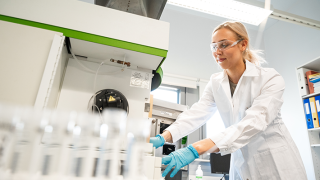Dissertation: Innovative adsorbent design for arsenic removal from water (Joseph)

The study explored the use of metal-organic frameworks (MOFs), a class of crystalline materials composed of metal ions and organic linkers. Their extremely high surface area, customizable pore sizes, and abundant active sites make them highly effective for adsorption applications. In this work, the MOF MIL-100(Fe) was combined with chitosan, a biodegradable polymer derived from the exoskeleton of crustaceans like crabs, shrimps, etc. Chitosan’s amino and hydroxyl groups enhance binding with MOFs as well as arsenic species, making it an ideal support material.
- To improve the composite’s performance, a small amount of manganese was introduced to MIL-100(Fe), creating a bimetallic structure, which further enhanced adsorption performance. The resulting hybrid efficiently removed both arsenic(III) and arsenic(V) from water, even in the presence of competing ions like phosphate, it maintained over 90% efficiency, indicating strong potential for practical use, explains project researcher Jessy Joseph from University of Jyväskylä.
Eco-friendly water purification
One of the key innovations in this study was the fabrication of a 3D-printed filter using powder-based selective laser sintering, embedding the composite into reusable, porous objects. In simulated groundwater tests, the filter reduced arsenic concentrations repeatedly from 2.5 mg/L to below the World Health Organization limit of 10 µg/L.
- The research demonstrates how nature-inspired materials and additive manufacturing can come together to deliver scalable, eco-friendly solutions for safe drinking water in arsenic-affected regions, rejoices Joseph.
Jessy Joseph defends her dissertation “Development of Metal-Organic Framework/Chitosan Composites for Arsenic Adsorption” on Friday August 15, 2025, at 12.00 o’clock in the lecture hall KEM4 at the University of Jyväskylä. Opponent is professor Timo Repo (University of Helsinki) and custos is senior lecturer Manu Lahtinen (University of Jyväskylä). The public defense is held in English.
The dissertation "Development of Metal-Organic Framework/Chitosan Composites for Arsenic Adsorption” will be available in the JYX publication archive: https://urn.fi/URN:ISBN:978-952-86-0923-0






